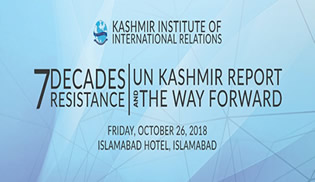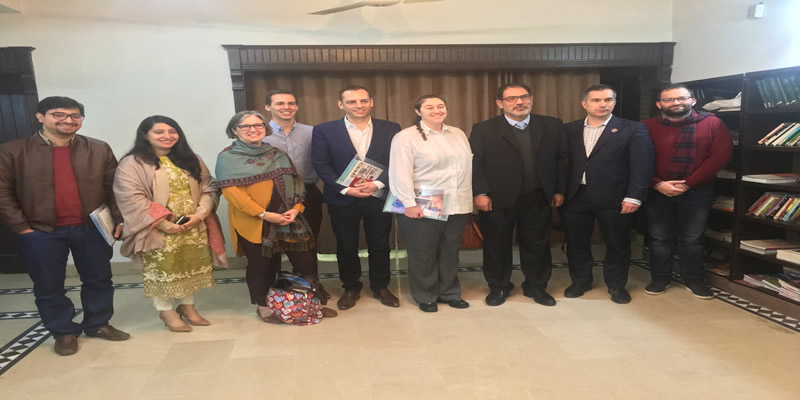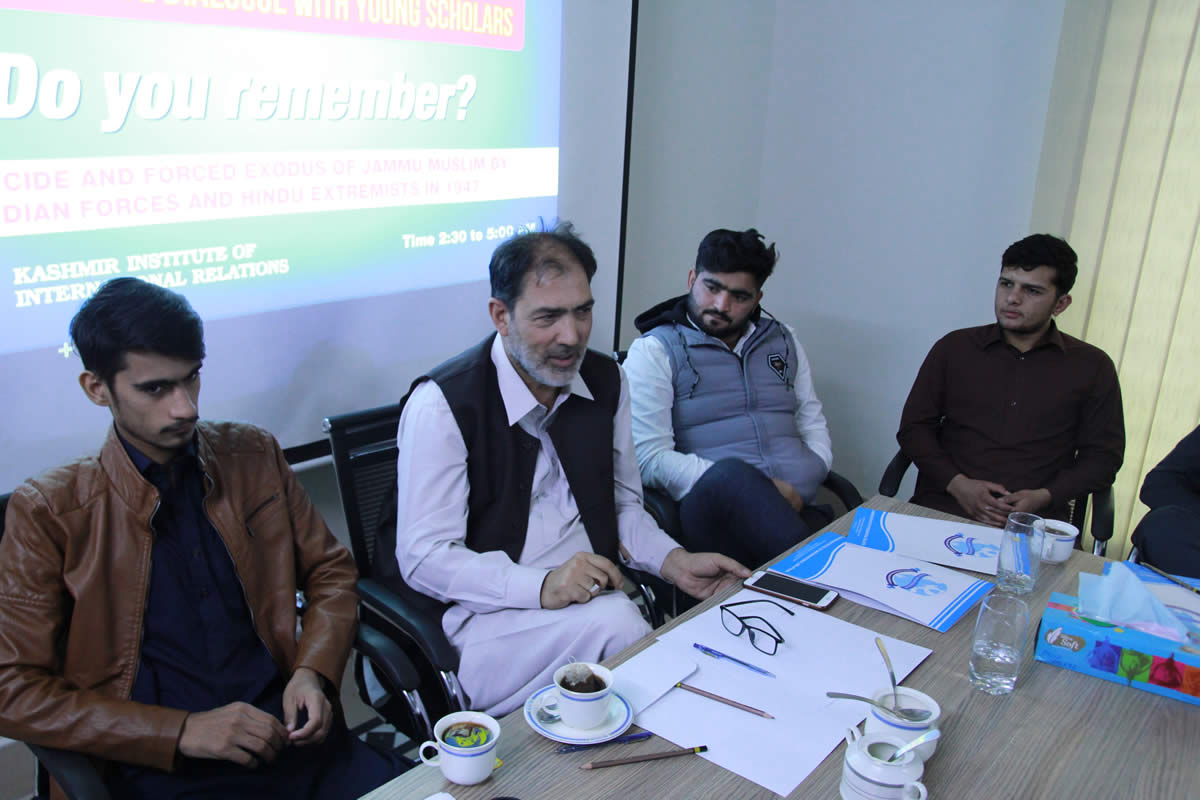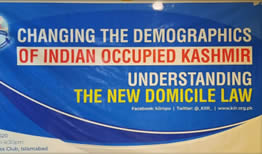Four Years of Unlawful Annexation: Impacts on Socio-Economic and Political Status of IOJK
Post Webinar Report
Four Years of Unlawful Annexation: Impacts on Socio-Economic and Political Status of IOJK
Date & Time
Aug 5, 2023 (5:00 – 7:00 pm)
Venue
KIIR Office
Moderator
• Altaf Hussain Wani, Chairman Kashmir Institute of International Relations
Speakers
• Robert Fantina, Canadian Journalist, Writer & Human Rights Activist
• Dr. Khurram Iqbal, Hon Associate Prof. at Dept of Security Studies & Criminology, Macquarie Uni, Australia
• Amb. Ahmad Chaudhary, Former Foreign Secretary of Pakistan
• Marry Scully, Human Rights Activist
• Cecilia Jastrzembska, Senior Policy Advisor in UK government
• Dr. Waqas Ali Kausar, Professor NUML
• Enes Alkan, University of Istanbul
• Prof. Arjun A Sethi, Prof. of Law at Georgetown University, US
• Syed Muhammad Ali, Nuclear & Strategic Analyst
• Amb. Abbas Ramadan, Amb. Of International Observatory for Documentation of Human Rights Violations with UN Agencies
Date & Time
Aug 5, 2023 (5:00 – 7:00 pm)
Venue
KIIR Office
Moderator
• Altaf Hussain Wani, Chairman Kashmir Institute of International Relations
Speakers
• Robert Fantina, Canadian Journalist, Writer & Human Rights Activist
• Dr. Khurram Iqbal, Hon Associate Prof. at Dept of Security Studies & Criminology, Macquarie Uni, Australia
• Amb. Ahmad Chaudhary, Former Foreign Secretary of Pakistan
• Marry Scully, Human Rights Activist
• Cecilia Jastrzembska, Senior Policy Advisor in UK government
• Dr. Waqas Ali Kausar, Professor NUML
• Enes Alkan, University of Istanbul
• Prof. Arjun A Sethi, Prof. of Law at Georgetown University, US
• Syed Muhammad Ali, Nuclear & Strategic Analyst
• Amb. Abbas Ramadan, Amb. Of International Observatory for Documentation of Human Rights Violations with UN Agencies
Highlights
The Kashmir Institute of International Relations organized a webinar that convened experts and luminaries from around the academic community to deliberate on critical issues about the Kashmir conflict in general and the webinar topic titled “Four Years of Unlawful Annexation: Impacts on Socio-Economic and Political Status of Indian Occupied Kashmir,” in particular. The webinar, held on August 5, 2023, at the Kashmir Institute of International Relations, Islamabad, welcomed distinguished speakers and participants who shared their expertise and insights on the subject matter. The webinar discussed the discriminatory policies that the government of India has been implementing in occupied Kashmir since the abrogation of Articles 370 and 35A in August 2019.
The speakers highlighted the economic, political, social, cultural, and religious impacts of unlawful annexation. The Indian government has imposed several economic restrictions on Kashmir, including a blockade on goods and services, which has led to a sharp decline in economic activity. This has disproportionately affected the poor and marginalized sections of society. The Indian government has suspended the Kashmiri constitution and assembly and imposed a military siege on the region. This has effectively neutered the political process in Kashmir and made it impossible for the Kashmiri people to exercise their democratic rights. The Indian government has cracked down on Kashmiri culture and religion.
Altaf Hussain Wani, Chairman of the Kashmir Institute of International Relations, opened the webinar by highlighting the impact of the revocation of Articles 370 and 35A on the people of Kashmir.
Mr.Wani highlighted that the abrogation of these articles has had a devastating impact on the lives of Kashmiris, both in terms of their social, political, and religious rights. He pointed out that the Indian government has imposed several restrictions on Kashmiris, including a curfew, a communications blackout, and a travel ban. These restrictions have made it difficult for Kashmiris to go about their daily lives and have also prevented them from exercising their political and religious rights. Mr. Wani also pointed out the Indian government cracked down on Kashmiri dissent along with the arrest and detention of thousands of Kashmiris. He emphasized that this crackdown has created a climate of fear and intimidation in Kashmir and has made it difficult for Kashmiris to speak out against the Indian government. Mr. Wani called on Robert Fantina to talk on the subject first.
Robert Fatina, a human rights activist, spoke about the human rights situation in Kashmir. He said that Kashmir is one of the most brutal examples of state-sponsored repression in the world today.
He cited several examples of how the Indian government has violated the Universal Declaration of Human Rights (UDHR) in Kashmir. He highlighted that Article 13 of the UDHR guarantees the right to freedom of movement and residence within the borders of each state. However, the Indian government has suspended the passports of several Kashmiri journalists and activists for criticizing the occupation of Kashmir. Furthermore, Article 19 of the UDHR guarantees the right to hold an opinion without interference. However, the Indian government has cracked down on freedom of expression in Kashmir, arresting journalists, harassing activists, and censoring the media.
The government of India ramped up internet blackouts and detained journalists who dared to voice dissent during mass protests against the revocation of Article 370. Similarly, he shed light upon Article 20 of the UDHR, which guarantees the right to freedom of peaceful assembly and association. However, the Indian government has frequently restricted freedom of assembly in Kashmir, often rejecting requests for permits for public gatherings submitted by Kashmiri leaders. For example, the authorities quickly arrested APHC leaders before planned demonstrations and violent clashes between protests and security forces are not uncommon. Talking about Article 15 of the UDHR which guarantees the right to a nationality and prohibits arbitrary deprivation of nationality, he highlighted that the Indian government has violated both provisions by abrogating Article 370 of the Indian Constitution, which granted Kashmir a certain degree of autonomy.
By encouraging Kashmiris to take pictures of themselves and their families waving the Indian flag, the Indian government is forcing them to endorse the Indian occupation of Kashmir. Mr. Robert also discussed Article 23 of the UDHR which guarantees the right to work, free choice of employment, just and favorable conditions of work, and protection against unemployment. However, the Indian government has imposed severe restrictions on employment opportunities in Kashmir, replacing Kashmiris with Indian nationals in major administrative and government jobs. As a result, unemployment in Kashmir is estimated to be 23.1%.
Robert Fantina concluded by saying that the Indian government has violated all the 30 articles of the UDHR in Kashmir. He called on the international community to take action to stop the human rights abuses in Kashmir. In addition to the articles mentioned by Robert Fantina, there are many other examples of human rights violations in Kashmir. For example, the Indian government has been accused of torture, extrajudicial killings, and enforced disappearances in Kashmir. Kashmiris have also been denied access to education, healthcare, and other essential services. He called on the world to"publicize these atrocities and advocate for these innocent victims." He also recommended that the international community impose sanctions on India and demand that it ends its human rights abuses in Kashmir.
Dr. Khurram Iqbal, Associate Prof. at Dept. of Security Studies & Criminology, Macquarie Uni, Australia, started his talk by posing the question if Hindutva in India is reversible or not.
He argued that the BJP has been successful in instituting Hindutva, or Hindu nationalism, throughout India. He pointed to the increasing influence of Hindutva in the Indian government, judiciary, and education system as evidence of this. He added that RSS philosophy is fascist, and it was permitted to rule the secular country for two consecutive terms, resulting in the marginalization of not just Kashmiris but also other minorities. The agenda will be completed through the Uniform Civil Court, and the BJP wishes to remove all components opposing the revocation. He also noted that the BJP has been able to pass legislation that discriminates against Muslims and other minority groups.
Furthermore, Dr. Khurram emphasized that the saffronization of India is not reversible because it has become institutionalized. He pointed to the fact that Hindutva is now taught in schools and universities and that Hindutva organizations have a significant presence in Indian society. He also noted that the BJP is likely to continue to win elections, which will allow it to further consolidate its power. Dr. Khurram argued that the BJP is likely to introduce a uniform civil code in the next election to further its Hindutva agenda. A uniform civil code would replace the personal laws of different religious communities, such as Muslim law and Hindu law.
This would mean that all Indians would be subject to the same laws, regardless of their religion. Dr. Khurram argued that this would be a major step towards creating a Hindu Rashtra. Dr. Khurram argued that the insurgency in Kashmir has not subsided, it has only changed forms. He pointed to the fact that there have been several low-intensity attacks in Kashmir in recent years. He also noted that the militants in Kashmir are now targeting civilian populations in India. Dr. Khurram argued that this is a sign that the insurgency is becoming more desperate. Dr. Khurram argued that Pakistan has tried to internationalize the Kashmir issue but with limited success.
He pointed to the fact that the United Nations has been unable to resolve the Kashmir issue and that most countries have been reluctant to criticize India on the issue. Dr. Khurram argued that this is because India is a major economic and strategic partner for many countries. Dr. Khurram argued that the internal political turmoil in Pakistan has hampered its ability to project the Kashmir issue on the international stage. He pointed to the fact that Pakistan has been ruled by several different governments in recent years, each with its priorities. He also noted that Pakistan has been criticized for its human rights record, which has made it difficult to win international support for the Kashmir cause.
Dr. Khurram argued that Pakistan needs to increase the stakes of international players in its economy to secure its core objectives in foreign policy.He pointed to the fact that Pakistan is a relatively poor country and that it is dependent on foreign aid. He also noted that Pakistan's economy is not very diversified, which makes it vulnerable to shocks.
Dr. Khurram argued that Pakistan needs to attract more foreign investment and trade to become more self-sufficient. Dr. Khurram argued that it is unclear whether Kashmir is still defined as a core objective in Pakistan's foreign policy. He pointed to the fact that Pakistan's 2022 non-security policy downgraded Kashmir from a core to a vital interest. He also noted that Pakistan has been focusing on other issues, such as its economy and relations with China, in recent years. Dr. Khurram argued that this could be a sign that Pakistan is losing interest in Kashmir.
Lastly Dr, Khurram put forward a question for all to ponder “Kashmir still is defined as a core objective in Pakistan's foreign policy because the non-security policy that was issued by Pakistan in 2022 degraded Kashmir from a core to a vital interest so that's something which has not been debated and discussed in Pakistan and this is the right time that if such degradation of career has happened what was the rationale behind that and how it can impact the future of Kashmir”. He gave some suggestions that,
o Pakistan should increase the stakes of international players in its economy to secure its core objectives in foreign policy.
o Pakistan should involve multinational companies from UAE, Saudi Arabia, and other Gulf countries in Pakistan's industrial revitalization program.
o Pakistan should continue to internationalize the Kashmir issue, despite the unconducive international environment.
Ambassador Aizaz Chaudhry, Former Foreign Secretary of Pakistan, started his talk by highlighting the illegality of India's annexation of Kashmir
He said that India's annexation of Kashmir violates the UN Security Council resolutions and the India-Pakistan Shimla Agreement. He argued that India is obligated to implement these resolutions but has not done so. Then he went on to discuss the other aspects of the Kashmir conflict, such as India's changing the demographics of Kashmir, its human rights abuses in Kashmir, and Pakistan's support for the Kashmiri people. The ambassador pointed out that India's annexation of Kashmir violates the UN Security Council resolutions and the India-Pakistan Shimla Agreement. These resolutions and agreements call for a peaceful resolution of the Kashmir conflict, and they specifically prohibit any unilateral changes to the status of Kashmir.
However, India has ignored these resolutions and agreements, and it has unilaterally annexed Kashmir. Furthermore, he emphasized that India is changing the demographics of Kashmir. India is issuing billions of new domiciles to non-Kashmiris to change the Muslim majority status of the region. This is a clear attempt to dilute the Kashmiri people's political power and to make it more difficult for them to achieve self-determination. The ambassador also said that India is destroying the cultural heritage of Muslims in Kashmir.
This is an attempt to erase the Kashmiri people's identity and to make them feel unwelcome in their land. Adding to it, India is committing human rights abuses in Kashmir. The ambassador said that India is subjecting Kashmiris to all kinds of brutalities and atrocities, including extra-judicial killings, custodial killings, and forced disappearances.
He also said that India is incarcerating journalists, lawyers, and human rights defenders. These human rights abuses are a serious violation of international law, and they are a stain on India's reputation. The ambassador highlighted Pakistan's support for the rights of Kashmiris. He said that Pakistan will continue to support the Kashmiri people until they achieve their right to self-determination. Pakistan has provided moral, political, and diplomatic support to the Kashmiri people for many years, and it will continue to do so until the Kashmiri people achieve their just demands.
The ambassador thinks that the international community must pressure India to respect the human rights of Kashmiris and work towards a peaceful resolution of the conflict. He said that the UN Secretary-General can play a more active role in promoting a peaceful settlement. The international community must do more to hold India accountable for its human rights abuses in Kashmir, and it must work to find a just and lasting solution to the Kashmir conflict. It is also significant because India's occupation of Kashmir is a major source of instability in the region. He said that the Kashmir conflict has been going on for over 70 years, and it has caused a great deal of violence and instability in the region.
The ambassador's point is that India's occupation of Kashmir is not only a violation of human rights but is also a threat to regional stability. The ambassador gave several suggestions and policy recommendations for the international community to take on the Kashmir issue.
• The international community must pressure India to respect human rights and resolve the Kashmir conflict.
• The UN Secretary-General can play a more active role in promoting a peaceful settlement.
• The international community must oblige India to reverse the demographic and other changes being made in the last four years.
• It should also pressure India to reverse all the other changes that have been made in the past four years and allow access to international observers and human rights Defenders to see for themselves.
• India must realize that the Kashmiris have been resisting India's rule India's occupation and why is it that India is not getting the message that the Kashmiris don't want to live with India?
Marry Scully, Human Rights Activist, started her talk by discussing the neoliberal economic policy that India has imposed on Kashmir in a very rapid way.
She argued that this policy is like colonialism in that it disempowers and disembowels the culture. It is displacing Kashmiri farmers and shopkeepers, and it is exploiting Kashmiri youth. Marry highlighted that the creation of 42 industrial quarters in Kashmir is a major threat to Kashmiri culture. These industrial quarters will be sweatshop zones that will exploit Kashmiri youth. They will also produce mass-produced goods that will replace traditional Kashmiri crafts and products.
This will have a devastating impact on Kashmiri culture and will erase much of its unique identity. She argued that Dubai is a major partner in India's neoliberal project in Kashmir and that the UAE is profiting from the exploitation of Kashmiris. She specifically mentioned that Dubai is creating a 500-shop mall in Kashmir. This mall will be like a super Walmart, and it will undermine the small shop economy in Kashmir. It will also dispossess thousands of small shopkeepers.
The mall is intended to appeal to wealthy Indian residents and to the new military entourage that comes with the Dubai investment. The neoliberal policy is also strengthening occupation. It is creating a new class of wealthy Indian settlers who are profiting from the exploitation of Kashmiris. Marry compared India's neoliberal policy in Kashmir to the Israeli model of settler colonialism. In both cases, the occupying power is using economic exploitation to weaken the indigenous population and strengthen its control. However, she also argued that India's neoliberal policy is different from the Israeli model in one important way. In Israel, the settlers are mostly Jewish, while in Kashmir, the settlers are mostly Indian. This means that the neoliberal policy in Kashmir is also a form of cultural genocide.
Adding to it, she also mentioned that the UAE is creating two major container terminals in Kashmir. These container terminals will be used to transport products made in sweatshop zones around the world. This means that Kashmiri products will no longer be made for Kashmiri people but for consumers in other countries. This will further erode Kashmiri culture and make it even more difficult for Kashmiris to maintain their way of life. She also discussed the news blackout in Kashmir.
She argued that this blackout is making it difficult to raise awareness of the Kashmiri struggle. She also argued that the news blackout is criminalizing Kashmiri journalists and activists. This makes it even more difficult for Kashmiris to speak out about their oppression and demand their rights. Marry concluded her talk by calling for solidarity from the international community. She argued that the Kashmiri people need support from the outside world in their struggle for self-determination.
Enes Alkans, from the University of Istanbul, started his speech by thanking the audience for inviting him and by giving a brief overview of the topic of his speech, which is the role of geography in the conflict over Kashmir
He then went on to discuss the three main points of his speech: The importance of geography in geopolitics, The strategic importance of water resources in Kashmir, and the importance of Kashmir for Pakistan. Alkan argued that geography plays a key role in geopolitics and that the location of Kashmir has made it a strategic point of contention for centuries. Kashmir is located between three nuclear powers (India, Pakistan, and China), and it is also a major source of water for both India and Pakistan.
This makes Kashmir a valuable prize for both countries, and it is one of the main reasons why the conflict over Kashmir has persisted for so long. Alkan also discussed the strategic importance of water resources in Kashmir. The Indus River, which originates in Kashmir, is a major source of water for both India and Pakistan. This makes Kashmir a vitally important region for both countries, and it is one of the main reasons why they have fought over it for so long.
Talking about the importance of Kashmir for Pakistan, Alkan argued that Kashmir is of strategic importance to Pakistan for three reasons. First, the Indus River, which originates in Kashmir, is a major source of water for Pakistan. Second, the control of Kashmir would allow Pakistan to strengthen its natural borders and maintain its strategic defense posture. Third, the predominantly Muslim population of Kashmir is a religious point for Pakistan.
He also highlighted the potential consequences of the Kashmir conflict. Alkan argued that the Kashmir conflict has the potential to have devastating consequences for both India and Pakistan. If the conflict continues, it could lead to a war between the two countries, which could have nuclear implications. It could also lead to a humanitarian crisis in Kashmir, as the people of the region are already suffering from poverty, violence, and displacement. Alkan concluded his speech by calling for a peaceful resolution to the Kashmir conflict. He argued that the conflict is not in the interests of either India or Pakistan and that it is only a matter of time before it leads to even greater tragedy. He urged both countries to come to the table and negotiate a solution that would be acceptable to both sides.
Prof. Arjun A. Sethi, professor of Law at Georgetown University, gave a powerful and informative talk on the human rights crisis in Kashmir. He said that Kashmir has been a laboratory for abuses committed by the Indian government.
It has a long history of human rights abuses, including extrajudicial killings, forced disappearances, and torture. In recent years, the Indian government has intensified these abuses, using national security laws to target Kashmiris. Thousands of Kashmiris have been arrested and detained without charge, and many have been tortured. The Indian government has also imposed internet blackouts in Kashmir, silencing dissent and preventing Kashmiris from speaking out about human rights abuses. Arjun then discusses the use of pellet guns by the Indian government to blind Kashmiris.
Pellet guns are designed to blind people, and they have been used to target Kashmiris who are often protesting peacefully. These abuses have caused widespread fear and trauma among Kashmiris. Moreover, he said that The Indian government's human rights abuses in Kashmir are not isolated incidents. They are part of a pattern of oppression against minority communities across India. The Indian government has used national security laws to target Muslims, and it has allowed lynchings of Muslims to take place.
He pointed out that the Indian government has imposed internet blackouts in Manipur, as it has in Kashmir, and that it has allowed lynchings of Muslims to take place in Manipur, as it has in other parts of India. Arjun argued that the Indian government's actions in Manipur are part of a broader pattern of oppression against minority communities and that we must pay attention to the human rights crisis in Manipur as well as in Kashmir. The Indian government has also cracked down on journalists and human rights defenders who speak out about human rights abuses.
While concluding his talk, he said we must pay attention to the human rights crisis in Kashmir. We must hold the Indian government accountable for its abuses. We must also connect the Kashmiri struggle to other global struggles for justice. The Indian diaspora must speak out against the human rights abuses in Kashmir. We must include Kashmir in the discussions about CAA, NRC, lynchings of Muslims, and the global Hindutva movement. We must not ignore the plight of Kashmiris.
Dr. Waqas Ali Kausar, Professor at NUML, started his talk by saying that the BJP government in India has been trying to suppress the legitimate resistance of the people of Kashmir for many years. He said that the BJP government has used a variety of tactics to achieve this, including targeting civil society leaders, pro-freedom leaders, and the media; changing the culture and language of Kashmir; and dividing the people of Kashmir by creating conflict between Muslims and non-Muslims, and between different tribes. They have also tried to change the culture and language of Kashmir to weaken the people's sense of identity.
Dr. Waqas then argued that the BJP government has also tried to divide the people of Kashmir by creating conflict between Muslims and non-Muslims, and between different tribes. This has further complicated the situation and made it more difficult for the people of Kashmir to unite in their struggle for self-determination. He, furthermore, criticized that India's policies are not in line with India's aspirations to be a global democratic tolerant society. The abrogation of Article 370, which gave Kashmir a special status in India, was a unilateral decision that was made without the consent of the people of Kashmir. This decision has been seen as a violation of Kashmir's autonomy and self-determination.
The crackdown on civil society in Kashmir has seen the arrest and detention of hundreds of human rights activists, lawyers, journalists, and students. This has silenced dissent and made it difficult for the people of Kashmir to express their views freely. The rise of Hindu nationalism in India has led to an increase in communal violence and discrimination against Muslims. This has created an atmosphere of fear and insecurity for Muslims in Kashmir, and it has made it difficult for them to live in peace
He said that India needs to uphold its democratic values and ensure that all its citizens are treated with respect, regardless of their religion, ethnicity, or caste. He also said that the Kashmir conflict is a major obstacle to achieving the Sustainable Development Goals, such as poverty eradication and climate change mitigation.He proposed that the only way to achieve these goals is to resolve the Kashmir conflict peacefully and through dialogue. Also discussing the Kashmir conflict as a political problem, he emphasized that it should be resolved through a political process.
He argued that the Indian government cannot use military force to solve the conflict and that the only way to achieve lasting peace is to start a dialogue with the people of Kashmir and address their legitimate concerns. Concluding his talk, he called on the Indian government to change course and start a genuine dialogue with the people of Kashmir to resolve the conflict. He said that this is the only way to achieve a wave of lasting peace in Kashmir
Cecilia Jastrzembska, Senior Policy Advisor, started her talk by saying that she was speaking in a personal capacity and that she would be taking her audience through three of the most problematic elements regarding Indian-occupied Kashmir
She then introduced the three themes of her talk: the war on accountability, the war on women, and the literal war. Talking about the war on accountability, she argued that the BJP government has suppressed independent journalism and silenced reporting on human rights abuses. In January 2023, police arrested Sajad Gul, a journalist at the Kashmir-based digital news site The Kashmir Walla, on charges of criminal conspiracy after he reported a public protest.
A month later, authorities arrested editor-in-chief Fahad Shah on sedition and terrorism charges after his site reported contradictory claims after a shootout in which Security Forces killed four people who they said were militants. Authorities rearrested both Gul and Shah under the Public Safety Act after they had been granted bail separately in cases filed against them, continuing their completely arbitrary detention. At the time of writing, since August 2019, at least 35 journalists in Kashmir have faced police interrogation, raids, threats, physical assault, restrictions on freedom of movement, or fabricated criminal cases for reporting.
Cecilia argued that the BJP government's suppression of independent journalism is a deliberate attempt to silence dissent and suppress information about its human rights abuses in Kashmir. She pointed to the cases of Gul and Shah as examples of how the government is using politically motivated criminal charges to jail journalists who expose or criticize its abuses. She also noted that the government has used foreign funding regulations and allegations of financial irregularities to harass human rights groups and political opponents. Furthermore, she highlighted that the BJP government has weaponized sexual violence against Muslim women in Kashmir.
She cited cases from August 2022, when the government approved the early release of 11 men who were convicted of gang rape and murder during the 2002 Gujarat riots. The men were convicted after a Muslim woman, Bilqis Bano, testified in court. Opposition lawmaker Mahua Moitra filed a petition in the Supreme Court challenging the early release, saying that the nation had better decide whether Bilqis Bano was a woman or a Muslim. Cecilia argued that the BJP government's early release of the men who gang-raped and murdered Bilqis Bano is a clear indication that the government is not serious about protecting women in Kashmir.
She also noted that laws forbidding forced religious conversion have also been misused to target Christians and other religious minorities in Kashmir. In July 2022, six Dalit Christian women were arrested on charges of forced conversion in Uttar Pradesh based on a complaint by a Hindu nationalist organization. Cecilia argued that the Indian government's military occupation of Kashmir is illegal and has resulted in the deaths of thousands of Kashmiris. She also noted that the government has used excessive force against civilians, including torture and extrajudicial killings. In the first nine months of 2022, the National Human Rights Commission registered 147 deaths in police custody, 1882 deaths in judicial custody, and 119 alleged extrajudicial killings in Kashmir.
Cecilia concluded her speech by calling for international pressure on the Indian government to end its human rights abuses in Kashmir. She said that the international community must hold the Indian government accountable for its crimes against the Kashmiri people. She provided the basis for her argument by highlighting The Indian government's continuous military occupation of Kashmir, resulting in the deaths of thousands of Kashmiris. In October 2022, there were 229 reported deaths in Kashmir, including 28 civilians, 29 security force personnel, and 172 suspected militants. Residents complained that some of those described as militants killed in gunfights were civilians, but no independent investigation was made public.
Syed Muhammad Ali, a Nuclear and Strategic Analyst started his talk by introducing the three levels of analysis that he later used to discuss the Kashmir issue. Focusing on a domestic level, he specifically discussed six dimensions of the Kashmir issue.
The first dimension is military occupation. India has occupied Indian-occupied Jammu and Kashmir (IIOJK) since 1947. This military occupation has had a devastating impact on the Kashmiri people. It has led to widespread human rights violations, including torture, extrajudicial killings, and arbitrary detention. It has also stifled economic development and marginalized the Kashmiri people politically and socially. The second dimension is human rights violations.
India has committed widespread human rights violations in IIOJK. These violations include torture, extrajudicial killings, arbitrary detention, and the use of excessive force. The Indian government has also cracked down on freedom of speech and assembly, and it has denied Kashmiris their right to self-determination.
The third dimension is legal and diplomatic violations. India's actions in IIOJK violate several United Nations Security Council resolutions and India's constitution. The United Nations Security Council has passed several resolutions calling for a plebiscite in Kashmir to determine the will of the Kashmiri people. India has refused to hold a plebiscite, and it has violated the terms of these resolutions. India's actions in IIOJK are also in violation of its constitution, which guarantees the right to self-determination to all its citizens.
The fourth dimension is demographic change. India has encouraged non-Kashmiris to settle in IIOJK, which has changed the demographics of the region. This has made it more difficult for Kashmiris to assert their political and cultural identity. The fifth dimension is economic marginalization and exploitation. India has marginalized and exploited the Kashmiri people economically. This has led to high levels of poverty and unemployment in Kashmir. India has also denied Kashmiris access to their natural resources, which has further impoverished the region.
The sixth dimension is identity politics. India is trying to diffuse and fragment the Kashmiri identity. This is being done through a variety of means, including the promotion of Hindu nationalism, the suppression of Kashmiri culture, and the gerrymandering of electoral districts. Talking about the regional importance of the Kashmir issue, Syed Ali highlighted that it has a significant impact on regional security and stability. He argued that India has been using the Kashmir issue to justify its military buildup in the region, which has led to an arms race between India and Pakistan.
This has created an unstable security environment in the region, which has made it more difficult to resolve the Kashmir conflict. The speaker also argued that India has been using the Kashmir issue to promote its interests in the region. For example, India has blocked SAARC summits from being held in Pakistan and has refused to participate in SAARC meetings when Pakistan is present. This has undermined SAARC's ability to promote regional cooperation.
Syed Ali then discussed the global analysis of the Kashmir conflict in three dimensions: Information warfare, diplomacy, and security. He argued that India has been using information warfare to distort the reality of Kashmir and discredit the Kashmiri freedom struggle. For example, In 2019, India launched a massive disinformation campaign against Kashmir. This campaign included the use of fake news, propaganda, and social media trolls. The goal of this campaign was to discredit the Kashmiri freedom struggle and to justify India's military crackdown in Kashmir. Furthermore, he highlighted that India has been using its diplomatic influence to hide the truth about Kashmir. Whenever it wants to join a multilateral or international forum, it presents a sophisticated approach and image of itself.
However, when it does become it exploits all the forums for its strategic motives. For example, The UN Security Council has passed several resolutions on Kashmir, calling for a plebiscite to determine the future of the region. However, India has blocked the implementation of these resolutions. Then the UN Human Rights Council expressed concern about India's human rights abuses in Kashmir. However, the Council has not taken any concrete steps to hold India accountable. Instead, unfortunately, almost all the Western nations are supporting to become permanent members of the council. Talking about BRICS, he highlighted that it is an emerging and very important international forum aiming to create a peaceful geoeconomics.
India is a member of BRICS, but it has used its influence in the forum to prevent any discussion of the Kashmir issue. Similarly, the goal of SAARC is to promote economic and social development in the region through cooperation in trade, investment, technology, and other areas. However, Syed Ali criticized that India has blocked SAARC summits from being held in Pakistan and has refused to participate in SAARC meetings when Pakistan is present.
Lastly, he pointed out that India being the main actor in South Asia continues to promote violence insurgency and terrorism. All India wants to dominated all other countries in the region rather than promoting peace, collaboration, and cooperation. Similarly, India has been using its military power to suppress the Kashmiri freedom struggle. India has imposed a military curfew in Kashmir and has cracked down on dissent.
India has also carried out cross-border shelling into Pakistan, killing civilians and soldiers. Lastly, he calls on international scholars, human rights activists, NGOs, think tanks, academics, politicians, and lawmakers to contribute to raising awareness of the Kashmir issue and to promote a peaceful resolution to the conflict.
He specifically mentioned the importance of consistency, coordination, and a comprehensive approach. He argued that the Kashmir issue cannot be addressed effectively if it is only discussed occasionally on important days. Instead, it needs to be a constant focus of attention for the international community. The speaker also emphasized the importance of globalization and technology in raising awareness of the Kashmir issue. He argued that these tools can be used to reach a wider audience and to make the Kashmir issue more visible to the world. Concluding the webinar, the speakers appreciated Mr. Wani Chairman of KIIR for keeping the Kashmir cause alive in these challenging times.
Ambassador Abbas Ramadan asked all to send the human rights violations documentation to them sine he is international observatory for documentation of human rights violations with UN agencies. At the end, all the guests urg ed to arrange a conference to have an official face to face meetup that is expected to be held in upcoming UNHRC session.
Takeaways
• India is subjecting Kashmiris to all kinds of brutalities and atrocities, including extra judicial killings, custodial killings, and forced disappearances. India is incarcerating journalists, lawyers, and human rights defenders. These human rights abuses are a serious violation of international law.
• Pakistan should increase the stakes of international players in its economy to secure its core objectives in foreign policy.
• Pakistan should involve multinational companies from UAE, Saudi Arabia, and other Gulf countries in Pakistan's industrial revitalization program.
• Pakistan needs to continue to internationalize the Kashmir issue, despite the unconducive international environment.
• Pakistan has provided moral, political, and diplomatic support to the Kashmiri people for many years, and it will continue to do so until the Kashmiri people achieve their just demands.
• The international community must oblige India to reverse the demographic and other changes being made in the last four years. It should also pressure India to reverse all the other changes that have been made in the past four years and also allow access to international observers and human rights Defenders to see for themselves.
• We must also connect the Kashmiri struggle to other global struggles for justice. The Indian diaspora must speak out against the human rights abuses in Kashmir. We must include Kashmir in the discussions about CAA, NRC, lynchings of Muslims, and the global Hindutva movement. We must not ignore the plight of Kashmiris.
• Considering the Kashmir conflict as a political problem, it should be resolved through a political process. The Indian government cannot use military force to solve the conflict and the only way to achieve lasting peace is to start a dialogue with the people of Kashmir and address their legitimate concerns.
• International scholars, human rights activists, NGOs, think tanks, academics, politicians, and lawmakers need to contribute to raising awareness of the Kashmir issue and promoting a peaceful resolution to the conflict.
• There is a need for a consistent, coordinated, and comprehensive approach to the Kashmir conflict. The Kashmir issue cannot be addressed effectively if it is only discussed occasionally on important days. Instead, it needs to be a constant focus of attention for the international community.
• We need to make use of globalization and technology in raising awareness of the Kashmir issue. These tools can be used to reach a wider audience and to make the Kashmir issue more visible to the world.
Photo Gallery
Past Events













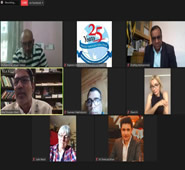
_1627626452.jpg)
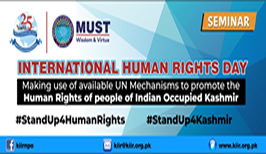
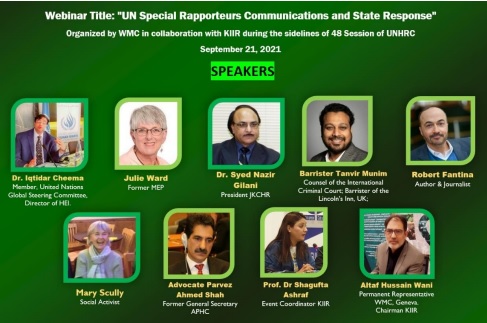
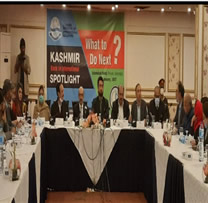
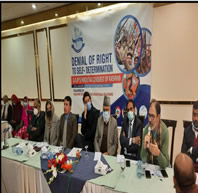
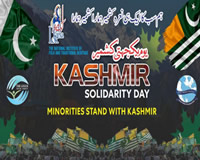
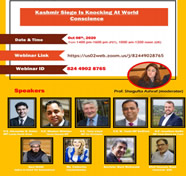
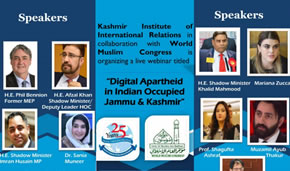
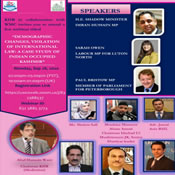
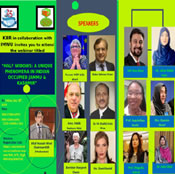
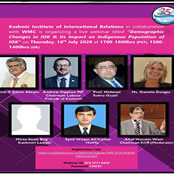
_1627627084.jpg)
